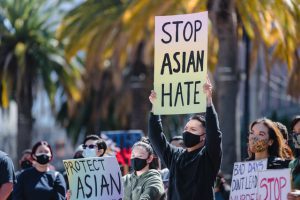State Senators John Lui and Kevin Thomas, along with several of their colleagues, recently introduced a bill that would require all of New York State public elementary and high schools to teach the history and civic impact of Asian Americans. Hunter’s Asian American Studies and HCAP program can serve as a model, says Vivian Louie, director of the Asian American Studies program and center.
Roosevelt House and the Asian American Studies center, brought a live Zoom panel discussion in honor of Asian American and Pacific Islander Heritage Month. The panel shed light on the daily experiences of Asian New Yorkers and the next steps in policy strategies to help address hate against a marginalized community.
The increase of Asian and Pacific Island incidents have nearly doubled to 6,603 in March alone this year, according to a national report released by the Stop AAPI Hate coalition.

“The model minority myth and the perpetual foreigner syndrome are two stereotypes that stop Asian Americans from getting access to benefits and representation,” said State Assemblymember of district 65, Yuh-Line Niou.
Niou says earlier this year, Chinatown faced online hate and rumors that restaurants were not clean and unsafe. This led her to hold a press conference to address that Asian restaurants go through the same food safety standards and health department checks like anybody else.
“It was disturbing that we had to say that out loud. You know it’s disturbing that we always have to say that we’re human out loud and that we belong,” says Niou. She cited an example of when Fox news reporter, Jesse Watters went to Chinatown, made fun of the seniors, used stereotypes and rationalization.
Executive director of the Chinatown Partnership Wellington Z. Chen says Chinatown went from 312 eateries to about 29 eateries remaining open in April. Now 260 are still hanging on, but many have not paid their rent. Chinatown at night has few customers, he said. Restaurants fear for their staff members safety so they close early due to recent attacks on the subway.
Niou announced that for the first time a $10 million budget was allocated for Asian American organizations at a state level. She highlights the lack of representation in the different levels of government, Asian Americans have less than 2% of state representation when they represent 13% of the population.
“When you’re talking about the laws, you’re also needed to be at the table to be able to change those laws,” said Niou.
Adjunct professor, Chris Kwok adds to the discussion the start Asian American invisibility.
For instance, the California Supreme Court case of People vs. Hall. George Hall was convicted for killing a chinese man in a mine, three Chinese witnesses testified. He was found guilty of murder, but appealed due to a statute where Native Americans and African Americans could not give testimony against the white man. It was extended to Chinese people because it was meant to include every non white person.
Hall won the appeal and established that Chinese Americans and Chinese immigrants had no rights to testify against a white citizens.
“Chinese people even though they were here for so long. They were not allowed to buy property, they were not allowed to have any ownership, they were not allowed to take out loans, they were not allowed to rent,” says Assembly member Niou.
“In America we don’t suppress history, we just leave it dusty on a bookcase to be forgotten and to be ignored,” says Kwok. “It’s there if you want it but you have to want it and you have to look for it,”.
